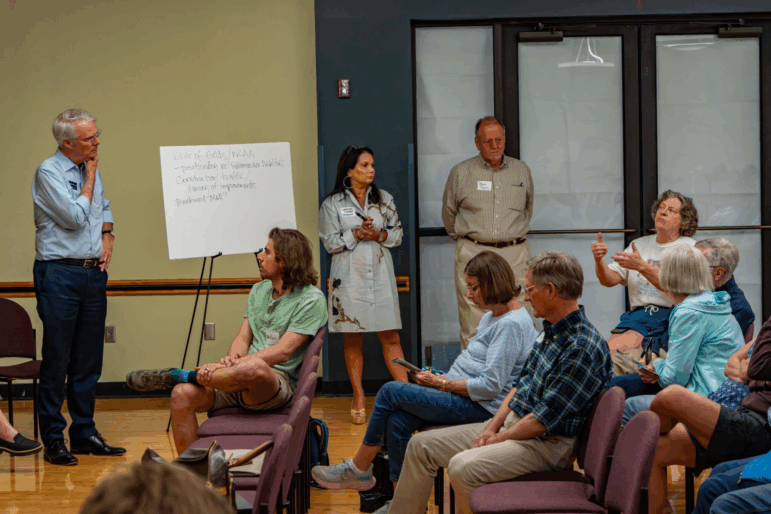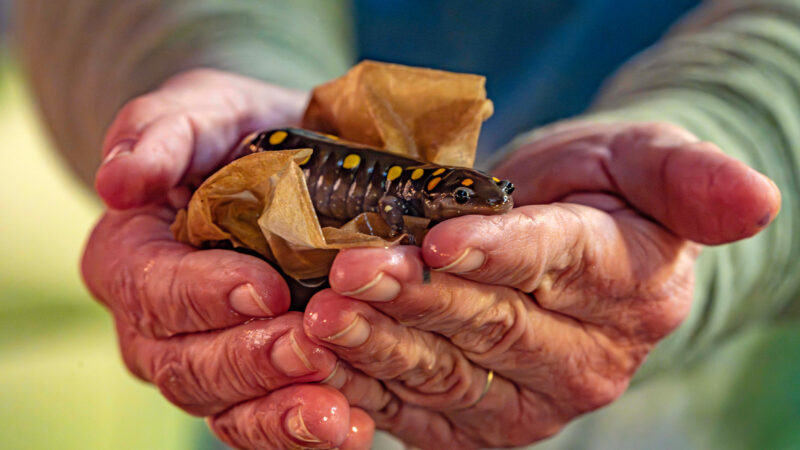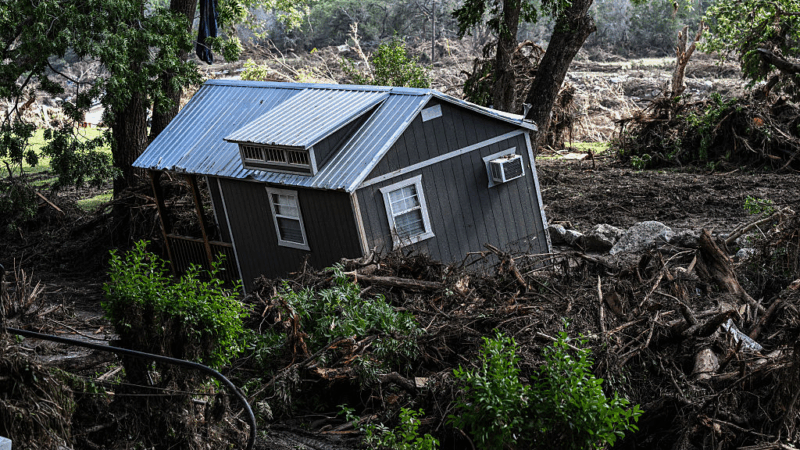For Homewood’s spotted salamanders, a win and a warning
Spotted Salamanders have long fallen victim to unbridled residential and commercial development that has threatened or destroyed their habitats.
This article originally appeared on Inside Climate News, a nonprofit, independent news organization that covers climate, energy and the environment. It is republished with permission. Sign up for their newsletter here.
By Lee Hedgepeth, Inside Climate News
HOMEWOOD, Ala.—Nine-year-old Ruby Banta thought it was a pretty simple choice, even for adults.
“This was the salamander’s habitat first,” she said after an afternoon soccer game. “It’s not a college habitat.”
Ruby was among the youngest of activists—sending a crayon-colored appeal to the City Council to save a sensitive salamander site—who had reason to celebrate this week. Officials at Samford University, a Baptist college just outside of Birmingham, announced a new location for sports fields in a planned commercial development that would have encroached on the habitat of the local spotted salamander population.
Dozens of Homewood residents, Samford community members and local environmentalists had opposed the earlier master plan of a development called Creekside. Homewood closely identifies with the salamander, which burrows on the slopes of Shades Mountain and migrates across South Lakeshore Drive every spring. For the past 20 years, the city has held a salamander festival to educate the public about its slippery spotted neighbor.
At a press conference Monday, the chief executive of Landmark Development, the company contracted by Samford University to complete the project, claimed victory in saving the population that his company’s proposal had put at risk.
“I think we can stand up now and very confidently say, ‘We saved the salamanders,’” Robert Dunn said about the agreement among the city, the university and Landmark to redraw its plans. “The issues of concern did not fall on deaf ears.” The sports facilities are now planned to be built further west to avoid the salamander habitat.
Ruby’s mother, Allison Banta, explained that the girl had learned about the salamander’s dilemma by reading an Inside Climate News report over her mother’s shoulder one night. She “was immediately enthusiastic about figuring out how to help,” Banta said.
Ruby, who has a pet lizard named Popcorn, told her third-grade teachers about the situation. She drafted a letter to City Council members about the salamander’s plight. “Please don’t build there,” Ruby wrote, her crayon drawing of a yellow-spotted salamander adorning the top of the page. “Samford already has an amazing school.”
She recruited friends to shift an already-planned yard sale to benefit Friends of Shades Creek, an all-volunteer nonprofit organization in central Alabama that publicized the threat. “Save the spotted salamander,” the children’s cardboard sign read.

Ruby is no stranger to the salamander. After a soccer game Tuesday, she chatted about a trip she’d taken during its mating season. She ventured out in her pajamas on a rainy night to help the creatures cross a roadway to one of several vernal pools where they lay eggs.
“We had to help them cross because it’s a pretty big road,” Ruby said. “So we have to protect them.”
University of Alabama at Birmingham biologist Megan Gibbons was among the organizers of the broader community opposition to the development and was pleasantly surprised when she heard the change in plans.
“I expected this would be an uphill battle that would end in disappointment,” Gibbons said. “But this is a rare win for the environment.”
“This is SUCH GREAT news!” Alabama Rivers Alliance, a statewide network of groups aimed to protect water resources, posted on social media. “Thank you to Friends of Shades Creek, Cahaba Riverkeeper, Cahaba River Society and everyone else who spoke up for the spotted salamanders! Compromises and creative solutions can be found when the right voices are gathered and heard.”
The environmental nonprofit that benefited from Ruby’s yard sale praised the decision and process in a statement. “Friends of Shades Creek is profoundly grateful to Samford University and Landmark for their willingness to listen to our concerns about the salamander vernal pool habitat and open mindedness to find a new solution for Creekside East.”
Samford University’s president said this week that the residents provided useful information and helped all parties reconsider. The development, billed as a “livable town square environment” including shops and eateries, is part of the university’s plan to expand and enhance its campus.
“Like any large development, we needed to hear the feedback of our community and the citizens of Homewood. The largest concern that was voiced was ecological damage, not just the salamanders but also the watershed and other related issues,” university president Beck A. Taylor said in a statement.
“We considered the concerns of our community and we went back to the drawing board. We tried to find an equally attractive opportunity or alternative. We found it. In fact, I would argue that it’s a much better alternative for us.”

Residents express their concerns about the Creekside development during a March meeting. (Lee Hedgepeth/Inside Climate News)
Gibbons said the new plan shows that positive change can happen when residents band together. Ruby and her friends were a notable example, she said.
The yard sale, she said, is “motivating for other kids. It’s motivating for neighbors, and it should be motivating for an institution like Samford.”
Despite this win, the threat of habitat loss for salamanders and other plants and animals is ever present, she said.
Research shows that spotted salamander populations are on the decline.
Three out of every five salamander species are at risk of extinction. Of the many threatened amphibian species, more than 90 percent face habitat loss, the most common threat.
“You can name any animal or plant, and if they’re in trouble—if their populations are in decline—the main reason is probably because of unbridled development. Development that’s not taking into account the environmental circumstances and the plants and animals that live there,” Gibbons said.
Even small wins in the face of imminent development are encouraging, she said.
“If we have more outcomes like this, maybe we can begin to reverse this pattern of habitat loss and destruction,” Gibbons said. “We need to be careful about where we’re developing and develop in an environmentally conscious way. It’s a constant battle, but we have to show up to the fight.”
Minnesota Republicans defend their focus on fraud despite the ICE surge that followed
Minnesota Republicans say they were right to invite social media influencers into the state to highlight social service fraud, though Democrats blame Republicans for paving the way for the ICE surge.
TV antennas and Super Bowl rehearsals: How prediction market traders seek an edge
As prediction markets boom, competition is heating up. So traders go the extra mile for a fraction-of-a-second advantage or to sleuth out information nobody else has. It can lead to a huge payday.
A once-underused immigration enforcement program has exploded under Trump
Partnerships between ICE and local law enforcement agencies has expanded widely, under the second Trump administration, data analyzed by NPR shows.
This behavior can be a turning point for families caring for a dementia patient
Wandering, and "elopement," are frightening and dangerous behaviors by people with dementia. For some families, it is the point when they begin to seek institutional care for their loved one.
3 big changes are proposed for FEMA. This is what experts really think of them
The Trump administration is proposing massive changes to the Federal Emergency Management Agency. We asked disaster experts to weigh in.
U.S. women’s figure skaters could’ve been rivals. Instead, they’re the ‘Blade Angels’
Amber Glenn, Alysa Liu and Isabeau Levito are the U.S.' best shot at winning women's figure skating gold since 2002 — and of closing out these Games on a high note.







